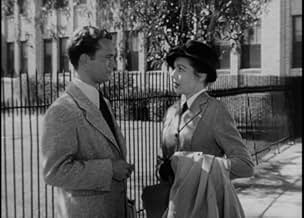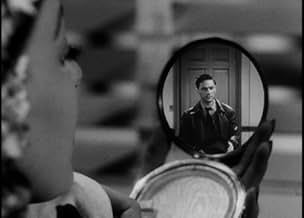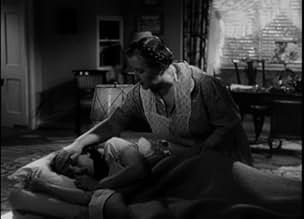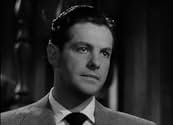NOTE IMDb
6,8/10
1,2 k
MA NOTE
Ajouter une intrigue dans votre langueA beautiful psychology professor tries to hide a self-defense killing.A beautiful psychology professor tries to hide a self-defense killing.A beautiful psychology professor tries to hide a self-defense killing.
- Réalisation
- Scénario
- Casting principal
- Récompenses
- 1 victoire au total
Billy Mauch
- Harry Brice
- (as Bill Mauch)
Eric Alden
- Detective
- (non crédité)
John Bishop
- Detective
- (non crédité)
Gladys Blake
- Boxing Fan
- (non crédité)
Barbara Brewster
- Miss Comar - Abe's Mother
- (non crédité)
Douglas Carter
- Detective
- (non crédité)
Avis à la une
It's hard deglamorize Loretta Young, and in fact, even the tailored outfits and the upswept hair don't do it in "The Accused" from 1949, also starring Robert Cummings and Wendell Corey. She's still considered quite a dish by anyone who meets her, including an amorous student (Douglas Dick).
Young plays a psychology professor who, about to be assaulted by a student, kills him and attempts to cover it up. At first it looks like a drowning, but later, it's discovered to be homicide. The young man's guardian (Cummings) arrives as the detective in charge of the case (Corey) zeroes in on Young.
Good movie with effective performances. Douglas Dick is appropriately smarmy.
My only objection would be, looking at it in light of today, the Young character made a bunch of mistakes with this guy that only a really foolish teacher would make today - or possibly back then. He is so obviously sexually aggressive, it's hard to believe she would have allowed herself to be alone with him.
Young and Cummings for me are always watchable, so I liked it.
Young plays a psychology professor who, about to be assaulted by a student, kills him and attempts to cover it up. At first it looks like a drowning, but later, it's discovered to be homicide. The young man's guardian (Cummings) arrives as the detective in charge of the case (Corey) zeroes in on Young.
Good movie with effective performances. Douglas Dick is appropriately smarmy.
My only objection would be, looking at it in light of today, the Young character made a bunch of mistakes with this guy that only a really foolish teacher would make today - or possibly back then. He is so obviously sexually aggressive, it's hard to believe she would have allowed herself to be alone with him.
Young and Cummings for me are always watchable, so I liked it.
The twist on what we now call sexual harassment lingers as the most interesting aspect of The Accused, an innocuous suspense story with some effective moments. Another lingering aftertaste is the midcentury stereotype of the female academic that's foisted on star Loretta Young -- and the viewer.
Psychology professor Young (!), guarded and old-maidish (she's even saddled with the glamourproof name Wilma Tuttle), becomes the object of the unhealthy attentions of one of her students (Douglas Dick). On the pretext of diving for abalone shells off Malibu, he spirits her off to a secluded lover's lane one night and forces himself on her. She bashes in his skull and fakes his death to look accidental.
Then she begins to attract more attention -- from Robert Cummings, a lawyer friend of the dead boy's family (he falls for her), and Wendell Corey, a dogged homicide cop. In the acting department, there's no contest; Cummings stays his usual namby-pamby self, while Corey delivers a strong, unsentimental performance, among his best.
Much of William Dieterle's direction shows a practiced hand. Especially well handled are the opening sequence of Young fleeing the crime scene, a boxing match where she suffers a flashback, and the ghoulish reconstructions of the murder by forensic pathologist Sam Jaffe.
But a glaring structural flaw keeps The Accused lukewarm. We know from the outset that Young acted in self-defense, which pretty well leeches all the suspense out of Corey's implacable pursuit; the tightening case against her packs no impact because it's safe to assume she won't be spending any time with those harpies from Caged. Consequently the film focuses more on her emergence from a cocoon of droopy skirts, a bun in her hair, sleeping pills and swooning spells into a seductive butterfly flitting into Cummings' net.
Dick, as the young narcissist, calls to mind such amoral charmers as Robert Walker in Strangers On A Train and John Dall in Rope (a film in which Dick also appeared). It's he -- not young nor Cummings -- who supplies what faint erotic spark this movie, about a sexually-based murder, dares to kindle.
Psychology professor Young (!), guarded and old-maidish (she's even saddled with the glamourproof name Wilma Tuttle), becomes the object of the unhealthy attentions of one of her students (Douglas Dick). On the pretext of diving for abalone shells off Malibu, he spirits her off to a secluded lover's lane one night and forces himself on her. She bashes in his skull and fakes his death to look accidental.
Then she begins to attract more attention -- from Robert Cummings, a lawyer friend of the dead boy's family (he falls for her), and Wendell Corey, a dogged homicide cop. In the acting department, there's no contest; Cummings stays his usual namby-pamby self, while Corey delivers a strong, unsentimental performance, among his best.
Much of William Dieterle's direction shows a practiced hand. Especially well handled are the opening sequence of Young fleeing the crime scene, a boxing match where she suffers a flashback, and the ghoulish reconstructions of the murder by forensic pathologist Sam Jaffe.
But a glaring structural flaw keeps The Accused lukewarm. We know from the outset that Young acted in self-defense, which pretty well leeches all the suspense out of Corey's implacable pursuit; the tightening case against her packs no impact because it's safe to assume she won't be spending any time with those harpies from Caged. Consequently the film focuses more on her emergence from a cocoon of droopy skirts, a bun in her hair, sleeping pills and swooning spells into a seductive butterfly flitting into Cummings' net.
Dick, as the young narcissist, calls to mind such amoral charmers as Robert Walker in Strangers On A Train and John Dall in Rope (a film in which Dick also appeared). It's he -- not young nor Cummings -- who supplies what faint erotic spark this movie, about a sexually-based murder, dares to kindle.
This is actually a love story and, as is usually the case with noirs of the 40s, a very well written one, especially since it deals with some rather tricky psychological matters, of which guilt complex resulting in fear approaching the borders of possible schizophrenia is just one. What makes this film more than average of classy noirs of the 40s with a romantic and seriously psychological intrigue is the interesting peripatetic moment of the boxing match, when Loretta Young unintentionally gives herself away, and how very interestingly Robert Cummings as her lawyer and lover reacts to that. The acting is superb throughout, the story is credible and convincing, the dilemma of unintentionally having killed someone and the natural urge to avoid the consequences and take responsibility for what was not intended, anyone can understand and relate to. To all this comes Victor Young's endearing score fashioning the experience with a golden frame, the beauty of which increases all the time. In brief, this is a much underrated, unjustly forgotten and deeply human and interesting film, that deserves some intention after having been more or less buried alive since 50 years.
Here is as "quiet" a suspense film as you are likely to encounter. That is all to the good, as beneath its placid surface crackle psychological crosscurrents that generate tension throughout. Each of the main characters is an interesting study, with ambivalent emotions that alternately spark and grate against those of the others. Additionally (and ironically), these characters are all involved in recognizing and dealing with such behavior, being a psychology professor, a detective and a lawyer respectively. A bit verbose at times, and resolved with a glib, less-than-satisfying ending, this picture nevertheless deserves a wider audience - if it has any at all nowadays. The performances are rock-solid and properly understated for the most part (even by Robert Cummings) in keeping with the conservative small town atmosphere; but there are effective contrasting performances as well, in the smaller roles of the few relatively unbalanced characters, as played by Douglas Dick, Suzanne Dalbert, and especially Sam Jaffee.
Good film noir concerning a prudish, but attractive, college prof that kills a student, during what today would be considered 'date rape.' Cummings and Corey are capable co-stars, and the lovely Young as always, is easy on the eyes.
Le saviez-vous
- AnecdotesOne of over 700 Paramount productions, filmed between 1929 and 1949, which were sold to MCA/Universal in 1958 for television distribution, and have been owned and controlled by Universal ever since. Its earliest documented telecast took place in Seattle Friday 24 October 1958 on KIRO (Channel 7); it first aired in Phoenix Friday 13 March 1959 on KVAR (Channel 12), and it soon became a popular local film favorite as it was first aired in Denver 9 April 1959 on KBTV (Channel 9), by both Chicago and Milwaukee 25 April 1959 on WBBM (Channel 2) and WITI (Channel 6), by Boston 10 May 1959 on WBZ (Channel 4), by Asheville 17 May 1959 on WLOS (Channel 13), by Grand Rapids 5 September 1959 on WOOD (Channel 8), by Detroit 22 September 1959 on WJBK (Channel 2), by Philadelphia 26 September 1959 on WCAU (Channel 10), by Los Angeles 3 October 1959 on KNXT (Channel 2), by Johnstown 30 October 1959 on WJAC (Channel 6), by Minneapolis 4 November 1959 on WTCN (Channel 11), by Toledo 20 November 1959 on WTOL (Channel 11), by Omaha 21 November 1959 on KETV (Channel 7), and by Pittsburgh 16 January 1960 on KDKA (Channel 2). It was released on DVD 28 September 2016 as part of the Universal Vault Series.
- GaffesWarren Ford invites Dr. Tuttle for breakfast, even though it is twelve noon, when lunch would be more appropriate.
- Citations
[Wilma is dressed for a date.]
Warren Ford: It's remarkable! Your brains don't show a bit.
- ConnexionsFeatured in Frances Farmer Presents: The Accused (1960)
Meilleurs choix
Connectez-vous pour évaluer et suivre la liste de favoris afin de recevoir des recommandations personnalisées
- How long is The Accused?Alimenté par Alexa
Détails
- Date de sortie
- Pays d’origine
- Langue
- Aussi connu sous le nom de
- The Accused
- Lieux de tournage
- Société de production
- Voir plus de crédits d'entreprise sur IMDbPro
- Durée
- 1h 41min(101 min)
- Couleur
- Rapport de forme
- 1.37 : 1
Contribuer à cette page
Suggérer une modification ou ajouter du contenu manquant






































